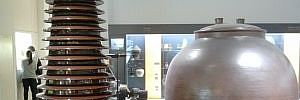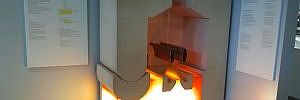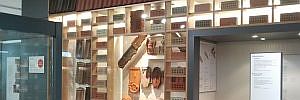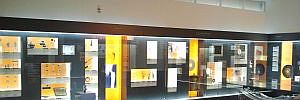Deutsche Version | Wiki Start | Topics Collection viii
Technology Everywhere ...
Monday, Jan 11, 2016. We live in a society where technology is in every part of our life. When we sleep, we have central heating. When we wake up, our alarm clock is usually a digital clock, which gets its time from the Internet or by some radiowaves which transmit time signals. When we go into the shower, it is heated by our central heating again.
What does it mean? …
Our car has a navigation system full of electronics. We use newly manufactured materials in our garment as well as the cups we have on the breakfast table, the machine which makes our coffee or the packing of our marmalade. Our day is full of computer work and communication which would not have been possible even 50 years ago. Technology is everywhere. By the way: this impression is not completely new, since even in 1850 you could have gained this impression with the industrial revolution, with steam engines and railways opening new spaces and connections, with the invention of the diesel engine and with first attempts to employ electricity - which came to a breakthrough around 1890.
What does it mean? In what way can we make sense of the technology which has been a huge success story for mankind. In what way does it change humans? It contributes to our understanding of this world, as did the early journeys which people did 3000 years ago with new techniques in the area of boat building and metal handling.
The role of human skills is not new. When you look into the Old Testament, you find the role of knowledge and technical skills discussed many times. Let us look at a positive example first. In the book of Kings, for example, skills are part of building the temple under king Solomon, the wise, …
13 And King Solomon sent and brought Hiram from Tyre. 14 He was the son of a widow of the tribe of Naphtali, and his father was a man of Tyre, a worker in bronze. And he was full of wisdom, understanding, and skill for making any work in bronze. He came to King Solomon and did all his work. 15 He cast two pillars of bronze. Eighteen cubits was the height of one pillar, and a line of twelve cubits measured its circumference. It was hollow, and its thickness was four fingers. The second pillar was the same. 16 He also made two capitals of cast bronze to set on the tops of the pillars. The height of the one capital was five cubits, and the height of the other capital was five cubits. (1 Kings 7, 13-16)
It is our choices for its use! …
The distinction which is made by the biblical texts is about how to use your skills. You can use them for good purposes. You can help and support and do well. And you can use them for vanity. You can destroy with your skills. Human creativity can be used for good and for bad. The prophet Hosea formulates a sincere warning here, have a look into it:
1 When Ephraim spoke, there was trembling; he was exalted in Israel, but he incurred guilt through Baal and died. 2 And now they sin more and more, and make for themselves metal images, idols skillfully made of their silver, all of them the work of craftsmen. It is said of them, “Those who offer human sacrifice kiss calves!” 3 Therefore they shall be like the morning mist or like the dew that goes early away, like the chaff that swirls from the threshing floor or like smoke from a window. (Hosea 13, 1-3)
There is nothing bad in technology. There is nothing bad in science. On the contrary, both reflect the fascinating dignity and ability of men. We are given reason and understanding. We are given creativity and skills. We are equipped with fantastic talents, on the scientific or technological side of life as well as in music and art. We are to use them, we are to live and develop them and use them for doing good to each other! (RWEP) ... more texts





